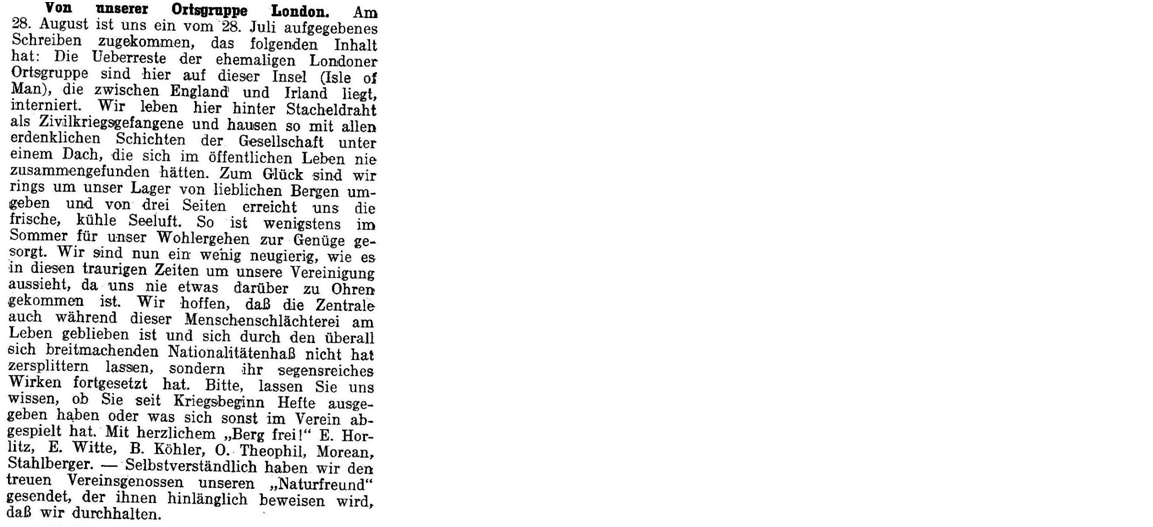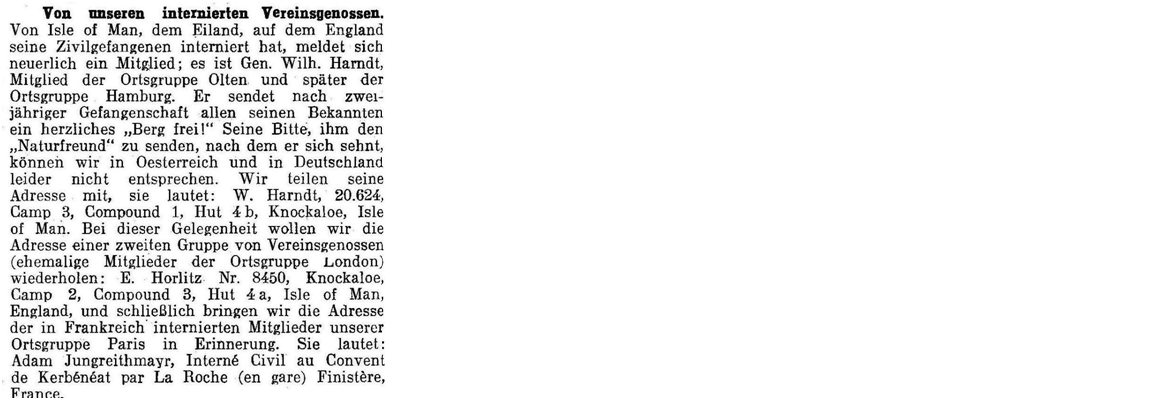Early documents on the history of the British Friends of Nature
At first glance, the Friends of Nature in Britain seem to be much younger than the Naturfreunde elsewhere. Yet, Dieter Gross proposes, according to documents presented here, in 2014 they will be able to celebrate a one-hundred anniversary.
read here
or pdf-DOWNLOAD About to be one hundred
The Friends of Nature are a world-wide hiking, nature sports, cultural and ecologically oriented club originating in the working-class movement. For their British branch, a recent book on the organization´s history, edited by the Nature Friends International, states 1966 as its founding year “in its present form”.[1] Yet also across the Channel the history of the Naturfreunde – “Friends of Nature” in its British, “Nature Friends” in its American version – is much longer. Obviously their story has not yet been told in any comprehensive way.[2] This short documentary paper does not fill in the gap, yet aims at providing a starting point for further inquiry.
The Naturfreunde were founded in Vienna, Austria, in 1895, and their international headquarters – with the exception of an interval, during the Austro-Fascist period, in Zurich, Switzerland – has remained there ever since. Original members by and large came from German-speaking backgrounds, and also publications were predominantly in German. The five documents published here have been gleaned from one such source, Der Naturfreund, then the Vienna-based international members´ magazine. In effect, these sources suggest that in 2014 we will see the one-hundredth anniversary of the Friends of Nature UK.
Basically the texts state that during its first flowering in the London area, the local club involuntarily became involved in the turmoil of the First World War. Members were incarcerated and the local club obviously was, in some unexplained way, dissolved.[3]
It is not clear to what an extent the London branch was revitalized after the First World War, what happened to the members mentioned in the documents, and whether Naturfreunde activities were otherwise resumed before the 1960s. It would also be interesting to find out whether or in how far the English club(s) followed the lead of other national organizations to build a system of clubhouses and members´ centres.
Document 1 (Der Naturfreund 1914, 166) reports on the founding of a daughter club in London. With few exceptions, the names mentioned imply German, Austrian, Swiss or Czech extraction, such as the name of Erich Horlitz, its first “president” (“Obmann”), who will reappear in all the documents below. Meetings took place on the fourth Wednesday of the month at the Communist Working Men´s Club (in those pre-Russian Revolution days the term “communist” was used synonymously with the terms “socialist” or “social democratic”).
Document 2 (Der Naturfreund 1915, 219) refers to the demise of the club already early in the First World War. In spite of its professed internationalist aims, London-based members were interned on the Isle of Man. The names mentioned are basically those of the founding report. Irony has it that the only positive aspect mentioned about the prison camp is the beauty of the landscape. The text promotes an explicitly anti-nationalistic agenda. It ends on the hope that the massacre of the War (“Menschenschlächterei”) might end soon, and that the Vienna headquarters, of which no information seems to have been available at the camp, might be active in spite of the war. The editors of Der Naturfreund, in return, promise to provide the prisoners with members´ magazines in order to show that the club is still active on the continent.
The information given in Document 3 (Der Naturfreund 1916, 21) took one month to arrive at the Vienna headquarters. The text bemoans the fact that – with the exception of one notice on September 2 – no communication from “enemy countries” is delivered to the inmates. But they now know that the international club is still active. Nostalgically, the text praises the memories of the precious hours spent in nature.
Document 4 (Der Naturfreund 1916, 183) makes clear that the interned comrades are German and Austrian. It names Horlitz´ prison camp address for further communication. Personal contacts are possible, but mailing German or Austrian newspapers is illegal.
Document 5 (Der Naturfreund 1916, 65) then reports on a letter by former German member Wilhelm Harndt (of the Olten and later Hamburg local branches), already imprisoned on the Isle of Man for two years. Witte extends the members´ greeting phrase, “Berg frei!” (“Mountains free!”), to his comrades on the continent. Horlitz´ address is mentioned again. Explicitly the text states that the London club is by now dissolved.
(The document adds [former?] Paris member Adam Jungreithmayr´s address, who with other members was isolated in the Finistere region of France. In a later issue, Der Naturfreund [1916, 95 – not reprinted here] again provides Jungreithmayr´s address, plus contact data with Hermann Schräge, a member of the Elberfeld [Germany] local interned in Le Creuzot prisoners camp.)
Dr. Klaus-Dieter Groß
Eichendorffstraße 3a
D-93051 Regensburg
dieter.gross@naturfreunde-bayern.de
[1] John Hubbard, „Naturfreundebewegung in Großbritannien“, in: Bruno Klaus Lampasiak, Leo Gruber, Manfred Pils. Berg frei – Mensch frei – Welt frei! Eine Chronik der internationalen Naturfreundebewegung von den Anfängen der Arbeiterbewegung bis zum Zeitalter der Globalisierung (1895-2005). Wien: Naturfreunde Internationale, 2nd. ed. 2009, 159-160. The quotation reads „in seiner heutigen Form“ (159).
[2] For the present-day Friends of Nature UK see http://www.thefriendsofnature.org.uk.
[3] Additional questions would include the categories the members mentioned were put in by the secret service before being assigned to imprisonment: „When war broke out more than 80.000 people in Britain with German or Austrian roots were registered by MI5 [the secret service] and classified under such rubrics as ´AA´ (Absolutely Anglicized or Allied), ´A´ (Anglicized/Allied), ´AB´ (Anglo-Boche), ´BA´ (Boche-Anglo), ´B´ (Boche) or ´BB´ (Bad Boche).“ (Peter Drexler. „Albion´s Watchful Eye: Chapters in the History of Surveillance in the UK“. Hard Times 92 (2012): 2-8, 6; with reference to Edward Higgs. The Information State in England: The Central Collection of Information on Citizens since 1500. Houndmills: Palgrave Macmillan, 2004. 111).





